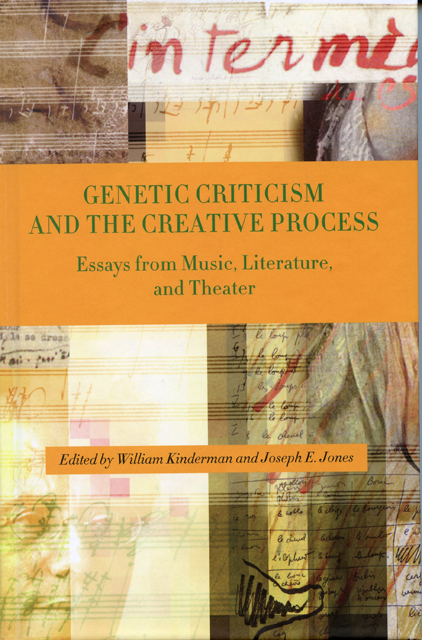Book contents
- Frontmatter
- Contents
- Acknowledgments
- Genetic Criticism and the Creative Process
- 1 Texts, Variants, and Variations: Evolving Contexts in Literature and Theater
- 2 Genetic Processes in Music: From Beethoven to Leroux
- 1 From Varieties of Genetic Experience to Radical Philology
- 2 Variant and Variation: Toward a Freudo-bathmologico-Bakhtino-Goodmanian Genetic Model?
- 3 The Genetic Record of a Voice: Variants in Barthes's Le Plaisir du texte
- 4 Can Genetic Criticism Be Applied to the Performing Arts?
- 5 “The hardy Laurel”: Beckett and Early Film Comedy
- 6 From Melodic Patterns to Themes: The Sketches for the Original Version of Beethoven's “Waldstein” Sonata, Op. 53
- 7 From Conceptual Image to Realization: Some Thoughts on Beethoven's Sketches
- 8 The Process within the Product: Exploratory Transitional Passages in Beethoven's Late Quartet Sketches
- 9 “They Only Give Rise to Misunderstandings”: Mahler's Sketches in Context
- 10 A Study of Richard Strauss's Creative Process: Der Rosenkavalier's “Presentation Scene” and “Schlußduett”
- 11 Genetic Criticism and Cognitive Anthropology: A Reconstruction of Philippe Leroux's Compositional Process for Voi(rex)
- Afterword
- Contributors
- Index
11 - Genetic Criticism and Cognitive Anthropology: A Reconstruction of Philippe Leroux's Compositional Process for Voi(rex)
Published online by Cambridge University Press: 02 March 2023
- Frontmatter
- Contents
- Acknowledgments
- Genetic Criticism and the Creative Process
- 1 Texts, Variants, and Variations: Evolving Contexts in Literature and Theater
- 2 Genetic Processes in Music: From Beethoven to Leroux
- 1 From Varieties of Genetic Experience to Radical Philology
- 2 Variant and Variation: Toward a Freudo-bathmologico-Bakhtino-Goodmanian Genetic Model?
- 3 The Genetic Record of a Voice: Variants in Barthes's Le Plaisir du texte
- 4 Can Genetic Criticism Be Applied to the Performing Arts?
- 5 “The hardy Laurel”: Beckett and Early Film Comedy
- 6 From Melodic Patterns to Themes: The Sketches for the Original Version of Beethoven's “Waldstein” Sonata, Op. 53
- 7 From Conceptual Image to Realization: Some Thoughts on Beethoven's Sketches
- 8 The Process within the Product: Exploratory Transitional Passages in Beethoven's Late Quartet Sketches
- 9 “They Only Give Rise to Misunderstandings”: Mahler's Sketches in Context
- 10 A Study of Richard Strauss's Creative Process: Der Rosenkavalier's “Presentation Scene” and “Schlußduett”
- 11 Genetic Criticism and Cognitive Anthropology: A Reconstruction of Philippe Leroux's Compositional Process for Voi(rex)
- Afterword
- Contributors
- Index
Summary
Motivations for Detailed Study of a Recent Compositional Process
It is a truism that sketch studies would not exist without archives dedicated to the creative processes of great artists of the past. Be it in the fields of literature, music, or any other art, sketch studies would be inconceivable were it not for the careful preservation of the artists’ working materials, which presupposes that they kept the documents in the first place, and that authoritative people regarded these artists as sufficiently significant to have the documents archived.
In view of this situation, the sketch study of a very recent musical work might seem hazardous or even irrelevant to musicology. On the one hand, the future integration of a work into any kind of canon is a gambit; can one justify the need for such a time-consuming study of one particular work over another? On the other hand, once such a study is undertaken, one definitively destroys the autonomy expected from a researcher with regard to his object of inquiry. Not only does one actively contribute thereby to the dissemination of the piece (at least within the academy), but one also accepts that the composer will infl uence the analysis, since he will be able to select which data are accessible and will provide the researcher with some insight into his creative process. Even if the composer’s account is embellished or simply inaccurate, it will unavoidably infl uence our understanding of the work.
Nevertheless, this chain of serious obstacles arises only if one embraces a restrictive view of sketch studies, a view linked to a particular (if widespread) aim—that of understanding the achievement of the final work, adding one's own response to previous engagements with the work in question. As soon as one changes or simply extends this agenda, both the method and the outcome of a sketch study may change. For example, the history of recent literate musical cultures should encourage elucidation of the incorporated skills and everyday practice of some contemporary composers, preferably those who are widely available in concert or on commercial recordings, and who have had a significant impact on younger composers—whatever legacy they may leave for posterity.
- Type
- Chapter
- Information
- Genetic Criticism and the Creative ProcessEssays from Music, Literature, and Theater, pp. 192 - 216Publisher: Boydell & BrewerPrint publication year: 2009
- 7
- Cited by

